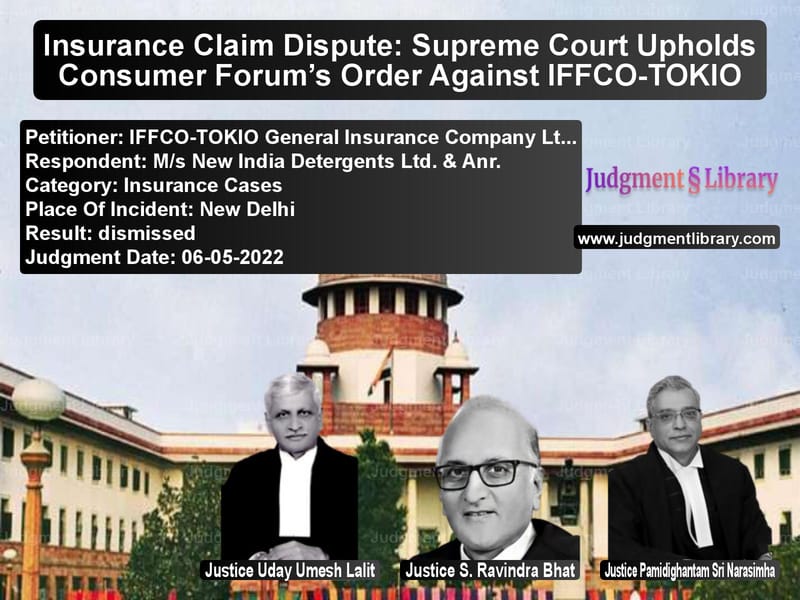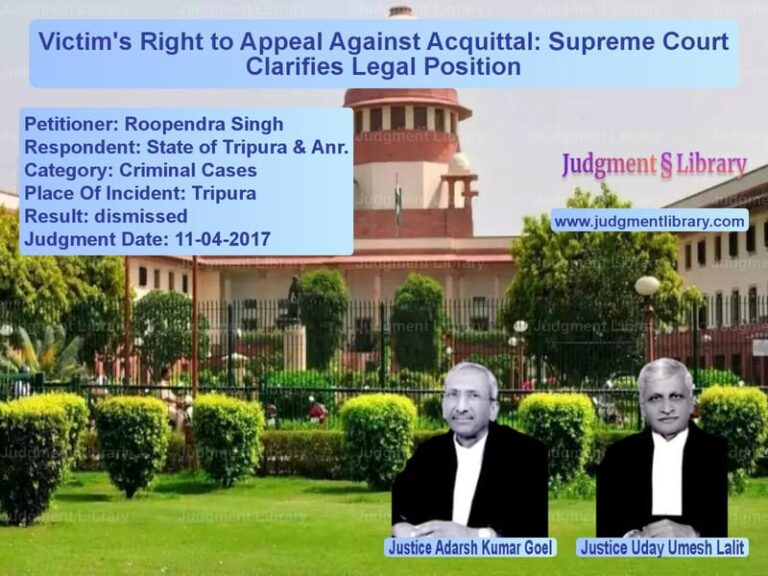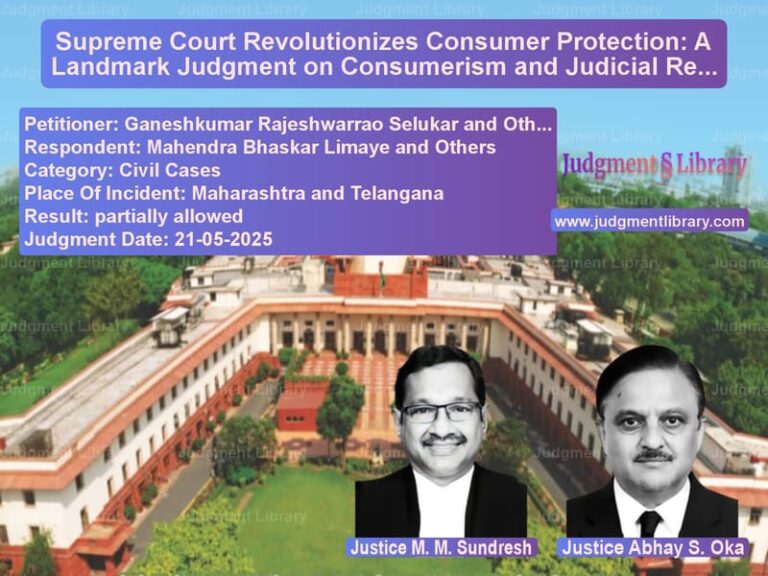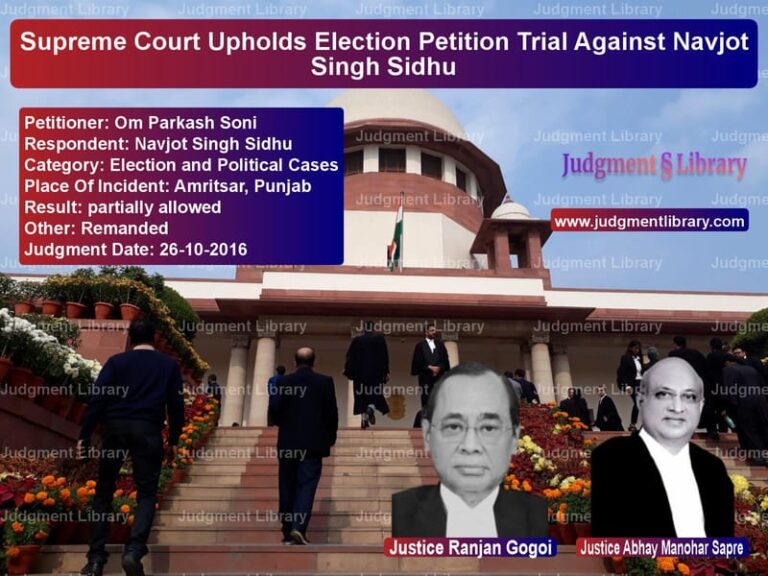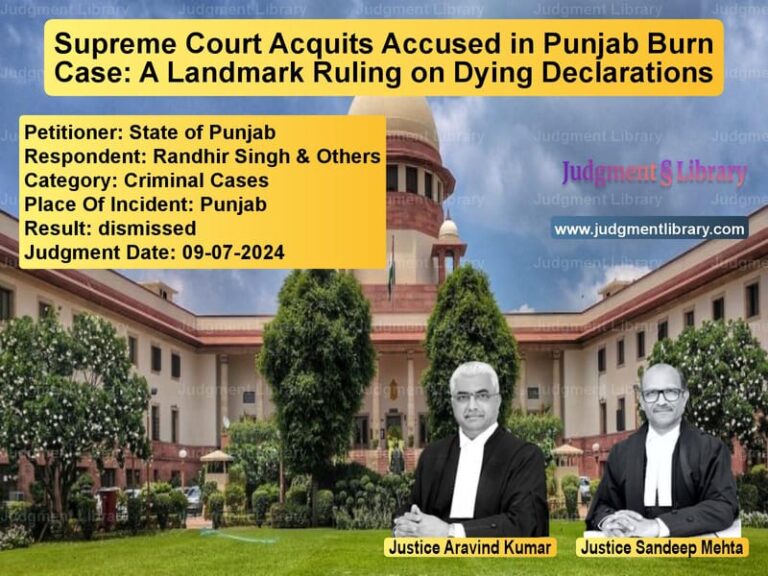Insurance Claim Dispute: Supreme Court Upholds Consumer Forum’s Order Against IFFCO-TOKIO
The Supreme Court of India recently ruled on an insurance dispute between IFFCO-TOKIO General Insurance Company Ltd. and M/s New India Detergents Ltd. The case involved the rejection of an insurance claim related to storage charges, leading to a legal battle that reached the highest court. The judgment provides clarity on the interpretation of exclusion clauses in insurance policies and the rights of consumers under the Consumer Protection Act.
Background of the Case
The dispute arose when M/s New India Detergents Ltd. filed a consumer complaint against IFFCO-TOKIO General Insurance Company Ltd. before the National Consumer Disputes Redressal Commission (NCDRC). The complaint was centered on an insurance claim for storage charges amounting to Rs. 80,18,944/-.
The NCDRC ruled in favor of the complainant and directed IFFCO-TOKIO to pay the claimed amount within eight weeks, failing which an interest of 9% per annum would be applicable. Aggrieved by this decision, IFFCO-TOKIO approached the Supreme Court, arguing that the claim was not payable under Clause 6.1 of the insurance policy, which contained an exclusion clause.
Legal Issues and Arguments
The primary legal issue in this case was whether Clause 6.1 of the insurance policy, which outlined specific exclusions, applied to the complainant’s claim for storage charges.
Arguments of the Appellant (IFFCO-TOKIO General Insurance Co.):
- The insurance company argued that the claim was specifically excluded under Clause 6.1 of the policy.
- It contended that the NCDRC had failed to consider the clear terms of the insurance contract, which excluded liability for certain types of claims.
- The insurer maintained that the contract terms should be strictly interpreted, and any claim falling under an exclusion clause should not be payable.
Arguments of the Respondent (M/s New India Detergents Ltd.):
- The complainant argued that the claim did not fall under the exclusion clause mentioned by the insurance company.
- It asserted that the insurance policy covered storage charges and that IFFCO-TOKIO’s refusal to honor the claim was arbitrary.
- The respondent also emphasized that the Consumer Protection Act is meant to protect consumers from unfair practices by insurance companies.
Supreme Court’s Judgment
The Supreme Court, after reviewing the policy terms and the arguments presented, ruled in favor of M/s New India Detergents Ltd. The key observations of the Court were as follows:
- “We affirm the view taken by the Commission that the matter would not be covered by the ‘Exclusion Clause’ in terms of Clause 6.1 of the Policy.”
- The Court found no merit in the appeal and dismissed it.
- It extended the deadline for payment by six weeks, with an interest clause applicable beyond the extended period.
Significance of the Judgment
This ruling is significant for policyholders and insurers alike, as it reinforces the following principles:
- Strict Interpretation of Exclusion Clauses: Insurance companies cannot rely on exclusion clauses unless they clearly and unambiguously apply to the claim.
- Consumer Rights Protection: The judgment upholds the spirit of the Consumer Protection Act by ensuring that policyholders are not denied legitimate claims based on technicalities.
- Legal Finality: The Supreme Court’s ruling provides finality to the case, preventing further delays in claim settlement.
Key Takeaways from the Case
- The insurer must prove that an exclusion clause applies to deny a claim.
- Consumer forums have the authority to interpret insurance policies in a manner that protects consumer rights.
- Strict contract interpretation cannot be used as a shield to deny genuine claims.
- The Supreme Court provides relief to policyholders facing arbitrary denials.
Conclusion
The Supreme Court’s decision in IFFCO-TOKIO General Insurance Company Ltd. vs. M/s New India Detergents Ltd. reinforces the principles of fair treatment of policyholders and limits the misuse of exclusion clauses in insurance contracts. By dismissing the appeal, the Court has ensured that insurers cannot evade their responsibilities under the guise of strict contractual interpretation. This ruling is a landmark victory for consumers seeking justice against arbitrary claim rejections.
Petitioner Name: IFFCO-TOKIO General Insurance Company Ltd..Respondent Name: M/s New India Detergents Ltd. & Anr..Judgment By: Justice Uday Umesh Lalit, Justice S. Ravindra Bhat, Justice Pamidighantam Sri Narasimha.Place Of Incident: New Delhi.Judgment Date: 06-05-2022.
Don’t miss out on the full details! Download the complete judgment in PDF format below and gain valuable insights instantly!
Download Judgment: iffco-tokio-general-vs-ms-new-india-deterg-supreme-court-of-india-judgment-dated-06-05-2022.pdf
Directly Download Judgment: Directly download this Judgment
See all petitions in Commercial Insurance Disputes
See all petitions in Insurance Settlements
See all petitions in Third-Party Insurance
See all petitions in Judgment by Uday Umesh Lalit
See all petitions in Judgment by S Ravindra Bhat
See all petitions in Judgment by P.S. Narasimha
See all petitions in dismissed
See all petitions in supreme court of India judgments May 2022
See all petitions in 2022 judgments
See all posts in Insurance Cases Category
See all allowed petitions in Insurance Cases Category
See all Dismissed petitions in Insurance Cases Category
See all partially allowed petitions in Insurance Cases Category

